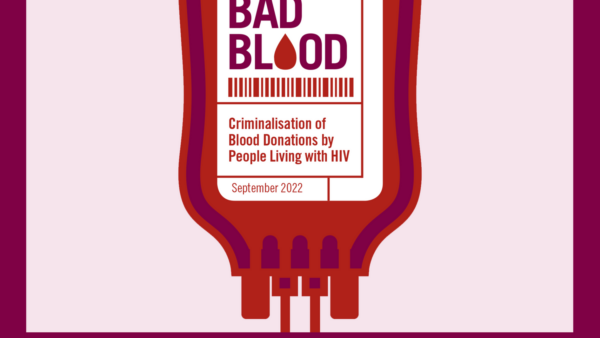Overview
Burkina Faso has two HIV-specific laws outlining the obligation of all persons living with HIV to disclose their HIV status to their sexual partners and to abstain from having unprotected sex. There is no definition of unprotected sex, which suggests that the prevention benefit of treatment might be used as a defence, as well as condom use.
However, non-disclosure of HIV-status prior to unprotected sex, even if their partner is also HIV-positive, is classified as deliberate transmission and can be punished in accordance with the provisions of the criminal code, even if transmission (i.e. alleged superinfection) did not occur.
In cases of alleged transmission, non-disclosure of HIV-status prior to unprotected sex leads to the charge of attempted murder, or even voluntary homicide if death occurs.
‘Voluntary transmission’ can be criminalised not only by means of sexual intercourse, but by blood donation, use of needles or other objects, or from mother-to-child transmission (see our report, Bad Blood, for a global analysis of the criminalisation of blood donations).
Our partners in Burkina Faso are aware of several cases but none are thought to have resulted in convictions. The only reported prosecution giving rise to a conviction related to an injection case, which qualified as aggravated assault.
In December 2023, civil society organisations met to call on authorities to revise the HIV law to ensure it is in line with latest scientific evidence, notably on undetectability.
Laws
Act No. 030-2008/AN on combating HIV/AIDS and protecting the rights of people living with HIV/AIDS
Article 1: […]
– HIV transmission: contamination of a healthy person by another person already infected with HIV, most often through sexual intercourse, blood transfusion, use of needles or other objects already contaminated or from mother to child;
– Voluntary HIV transmission: the conscious inoculation of HIV-infected substances into a person in any way whatsoever that these substances have been used or administered.
Article 7: Every person living with HIV is required to disclose his or her HIV status to his or her spouse or sexual partner without delay.
Article 10: Any person knowing that he or she is infected with HIV must refrain from unprotected sexual intercourse with another person.
Article 20: Any person who knows he or she is infected with HIV and who knowingly has unprotected sexual intercourse with a partner who is not informed of his or her HIV status, even if he or she is HIV-positive, is guilty of the crime of wilful transmission of HIV and is punished in accordance with the Criminal Code.
Article 22: Anyone who has voluntarily transmitted HIV-infected substances by any means whatsoever is guilty of the deliberate transmission of HIV.
Any person who has granted or provided the means to commit the offence referred to in paragraph 1 shall be an accomplice to the act of voluntary transmission.
Persons guilty of or complicit in the act of wilful transmission of HIV are punished in accordance with the provisions of the Criminal Code.
Article 26: Anyone who is aware of his or her HIV status and fails to take the necessary and sufficient precautions to protect his or her partner(s) shall be subject to criminal sanctions.
Anyone who knows that he or she is infected with HIV and does not take the necessary and sufficient precautions to protect his or her partner(s) is liable to a fine of one hundred thousand (100,000) CFA francs to one million (1,000,000) CFA francs. If contamination has resulted, the penalty is attempted murder in accordance with the provisions of the Criminal Code.
Law n°045 -2005 / AN of 21 December 2005 on Reproductive Health in Burkina Faso
Law n°045 -2005 / AN of 21 December 2005 on Reproductive Health in Burkina Faso
Article 17: Any individual who is aware of his or her status as a patient with sexually transmitted infections (STIs) or human immunodeficiency virus (HIV) infection has a duty to inform his or her partner (s).
Article 18: Any individual who is aware of his or her state of infection with the Human Immunodeficiency Virus (HIV) and who does not take sufficient precautions to protect his or her partner(s) is subject to criminal sanctions.
Anyone who suffers from a serious sexually transmitted infection or HIV who fails to take sufficient precautions to protect his or her partner(s) shall be punished by a fine of one hundred thousand (100.00) to one million (1,000,000) CFA francs.
If contamination has resulted, the penalty is attempted murder in accordance with the provisions of the Criminal Code.
If death results, the penalty is voluntary homicide, in accordance with the provisions of the Criminal Code.
Article 22: The following shall be prohibited and punished in accordance with the laws and regulations in force:
– All forms of sexual violence;
– Female genital mutilation;
– Castration;
– Voluntary transmission of HIV/AIDS;
– Sexual exploitation in all its forms;
– Misleading advertising on contraceptive methods;
– The dissemination of images and messages that may affect reproductive health.
Further resources
This document is an analysis, conducted in collaboration with UNDP, of the Burkinabe legal framework addressing issues of criminalization of key populations and including a section on the criminalization of HIV transmission in Burkina Faso (page 77).
Acknowledgements
Report presenting the results of a survey on HIV criminalization in African countries where French is spoken (hereinafter "Francophone Africa"), conducted from May to September 2017.
Authors: Stéphanie Claivaz-Loranger & Cécile Kazatchkine for the Canadian HIV Legal Network and HIV JUSTICE WORLDWIDE
HIV Justice Network's Positive Destinations
Visit the Burkina Faso page on Positive Destinations for information on regulations that restrict entry, stay, and residency based on HIV-positive status, as well as access to HIV treatment for non-nationals.


